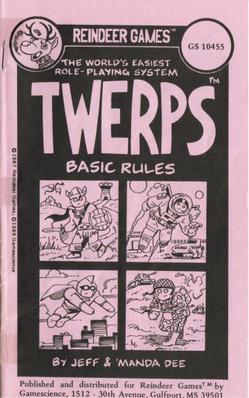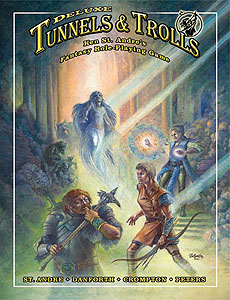
Call of Cthulhu is a horror fiction role-playing game based on H. P. Lovecraft's story of the same name and the associated Cthulhu Mythos. The game, often abbreviated as CoC, is published by Chaosium; it was first released in 1981 and is in its seventh edition, with licensed foreign language editions available as well. Its game system is based on Chaosium's Basic Role-Playing (BRP) with additions for the horror genre. These include special rules for sanity and luck.

TWERPS is a minimalist role-playing game (RPG) originally created by Reindeer Games in 1987 and distributed by Gamescience. Presented as a parody of the complicated RPG systems which were prevalent at the time while still being a playable game in its own right, its simple structure and humorous nature gave it unexpected popularity.

Tunnels & Trolls is a fantasy role-playing game designed by Ken St. Andre and first published in 1975 by Flying Buffalo. The second modern role-playing game published, it was written by Ken St. Andre to be a more accessible alternative to Dungeons & Dragons and is suitable for solitaire, group, and play-by-mail gameplay.

The Fantasy Trip (TFT) is a fantasy tabletop role-playing game designed by Steve Jackson and published in segments by Metagaming Concepts starting in 1977 and culminating in 1980. In 2019, Steve Jackson Games republished it as The Fantasy Trip Legacy Edition.

Villains and Vigilantes is a superhero-themed role-playing game which competed primarily with Champions and Superworld in the early to mid-1980s.

Champions is a role-playing game published by Hero Games designed to simulate a superhero comic book world. It was originally created by George MacDonald and Steve Peterson in collaboration with Rob Bell, Bruce Harlick and Ray Greer. The latest edition of the game uses the sixth edition of the Hero System, as revised by Steve Long, and was written by Aaron Allston. It was released in early 2010.

Oriental Adventures is the title shared by two hardback rulebooks published for different versions of the Dungeons & Dragons (D&D) fantasy roleplaying game. Each version of Oriental Adventures provides rules for adapting its respective version of D&D for use in campaign settings based on the Far East, rather than the medieval European setting assumed by most D&D books. Both versions of Oriental Adventures include example campaign settings.
Worlds of Wonder is a multi-genre set of three role-playing games (RPGs) produced by Chaosium in 1982 that all used the Basic Role-Playing set of rules.

Dragon Warriors is a fantasy role playing game (RPG) system written by Dave Morris and Oliver Johnson and published by Corgi Books in 1985 and 1986. In 2009, it was re-collected in a new hardcover edition by Mongoose Publishing. This print run included the publication of several supplements to the Dragon Warrior's world "Legend". However, as of September 2010, this publication run had been discontinued but the books continue to remain available in PDF format.

James Michael Ward III was an American game designer and fantasy author who worked for TSR, Inc. for more than 20 years, most notably on the role-playing game Dungeons & Dragons. He wrote various books relating to Dungeons & Dragons, including guidebooks such as Deities & Demigods, and novels including Pool of Radiance, based on the computer game of the same name.

Powers & Perils (P&P) is a fantasy role-playing game published by Avalon Hill in 1984. The highly complex game was Avalon Hill's first foray into the role-playing game market, and proved to be a commercial failure.

The Pathfinder Roleplaying Game is a fantasy role-playing game (RPG) that was published in 2009 by Paizo Publishing. The first edition extends and modifies the System Reference Document (SRD) based on the revised 3rd edition Dungeons & Dragons (D&D) published by Wizards of the Coast under the Open Game License (OGL) and is intended to be backward-compatible with that edition.

The original Dungeons & Dragons boxed set by Gary Gygax and Dave Arneson was published by TSR, Inc. in 1974. It included the original edition of the Dungeons & Dragons fantasy role-playing game. Its product designation was TSR 2002.

Blackmoor is a supplementary rulebook of the original edition of the Dungeons & Dragons fantasy role-playing game written by Dave Arneson.

The Expert Set is an expansion boxed set for the Dungeons & Dragons fantasy role-playing game. It was first published in 1981 as an expansion to the Basic Set.

Lords of Creation is a multi-genre tabletop role-playing game published by Avalon Hill in 1983. Although expectations were high when Avalon Hill entered the role-playing game market, the game failed to find an audience and was discontinued relatively quickly.

Adventures in Fantasy is a role-playing game published by Excalibre Games in 1979, designed by Dave Arneson and Richard Snider. The game is a fantasy system, similar to early Dungeons & Dragons (D&D), which Arneson co-created. It received mixed to negative reviews in game periodicals, including The Space Gamer, Ares, and Pegasus, and ultimately flopped. Arneson later bought the rights to Adventures in Fantasy and published a new edition in 1981 through his own company Adventure Games.

Mordenkainen's Tome of Foes is a sourcebook for the 5th edition of the Dungeons & Dragons fantasy role-playing game, published in 2018. It is, in part, a supplement to the 5th edition Monster Manual and the Players Handbook.
Advanced Phantasm Adventures is a fantasy role-playing game published by T.C. International in 1992.
Bloodbath is a fantasy role-playing game published by T.C. International in 1988.

















